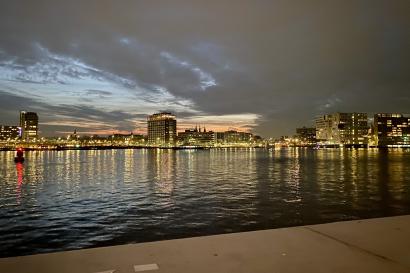
Hey everyone!
Are you a morning person? Me neither. But as much as waking up early is the worst, if you plan on coming to China I would advise trying to do it at least once, because I promise parks are best visited in the early morning. Every morning the elderly like to gather in city parks to exercise and socialize. Because one of my classes took a field trip to Hongkou Park early Friday morning, I thought now would be a good time to talk about some of the activities that are commonly found in Chinese parks (I can verify that most of these can also be found in parks in Beijing).
The Dancers - dancing is a popular form of exercise in China, especially among the elderly. In the mornings, they will gather in public parks and practice routines to music played on portable stereos. It is common to find both large and small groups, and an assortment of dancing styles. There is usually at least one group of couples dances (salsa, swing, and ballroom are common styles), and a few women’s groups that prefer pop music. The dancers don’t typically mind if foreigners join in, and if you’re lucky you will meet a nice person willing to help teach you, so feel free to jump in!
Tai Chi - as many foreigners know, Tai Chi is a popular style of martial arts to practice in the early mornings. The movements are slow and controlled, and focus on the movement of power through the body. Again, many people don’t mind foreigners trying it out, although if you do attempt know that this is a more serious practice, so cultural sensitivity is necessary.
Poker - if you see a large group of men smoking and shouting in a circle, chances are you are seeing a poker game. Poker is definitely more popular amongst the men, and the most excited I’ve ever seen an elderly Chinese man was when he was playing poker. Feel free to peek over their shoulders, but beware that secondhand smoke.
Chess/checkers - these games draw smaller crowds, and may only have one or two spectators per game, but these are also common games for public parks. Often, they will play with nice pieces on a grid made of laminated paper that has been folded and unfolded probably hundreds of times.
Exercisers - one of the best parts about Chinese parks is that almost all of them sport an area with exercise equipment for low-impact workouts. The structures often look almost like playground equipment, as they tend to be painted in fun colors. Chinese elderly are surprisingly health-conscious.
Calligraphy - calligraphy is amazingly difficult. It takes concentration and control and years of practice. But when people are good at it, they are GOOD at it. One of the things I’ve seen in multiple cities is people practicing their calligraphy using a brush (sometimes one with the tip made out of a sponge and long enough that they can write standing up) and water, right on the pavement. It always amazes me how well these people can write, using just water and a brush.
Bird Walkers - I wasn’t aware that this was an activity until yesterday, when we were walking through the park and stumbled upon an area with at least 20 bird cages hanging out in the trees. Chinese people, especially the elderly, love to raise singing birds, and I guess they feel that keeping them cooped up makes them depressed and unwilling to sing, so they will bring them to the park in the morning to socialize with other birds.
Of course, each park has it’s own crowds, which I’m sure changes exactly what activities you will find. Other things I have seen include badminton, Chinese yo-yos, fishing, and public newspaper reading (where they will post the daily paper on a message board, and people will just stand and read the paper). Because there is such a wide range of activities that go on in public parks, and most of them happen in the morning, I would definitely advise making the effort to visit at least once. It is an experience, if nothing else!
That’s all for this week! Until next time!

Katie McGee
<p>Hello! My name is Katie McGee, and I am a junior at the University of Puget Sound, located in Tacoma, WA. I am a Chinese major with a Japanese minor and a Global Development Studies emphasis. I am a Chinese adoptee, and although my parents did their best to expose me to Chinese culture as a child, I grew up in a community with very little diversity. I have devoted this year to traveling East Asia (South Korea, Taiwan, Mainland China, and Japan) and improving my Chinese along the way. I have already learned so much during my travels, but continue to look forward to what adventures lay ahead.</p>





